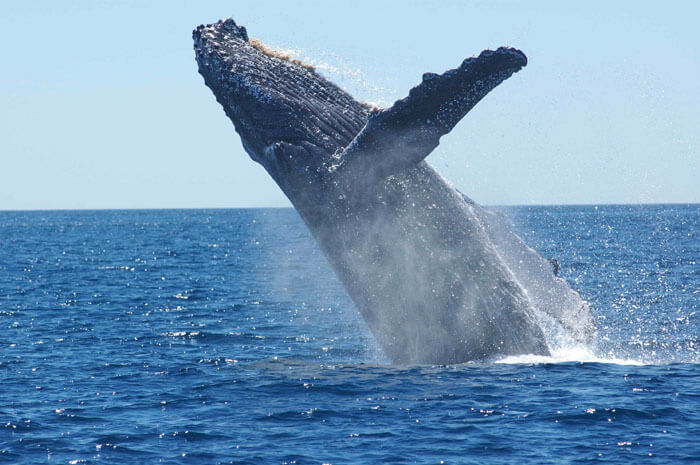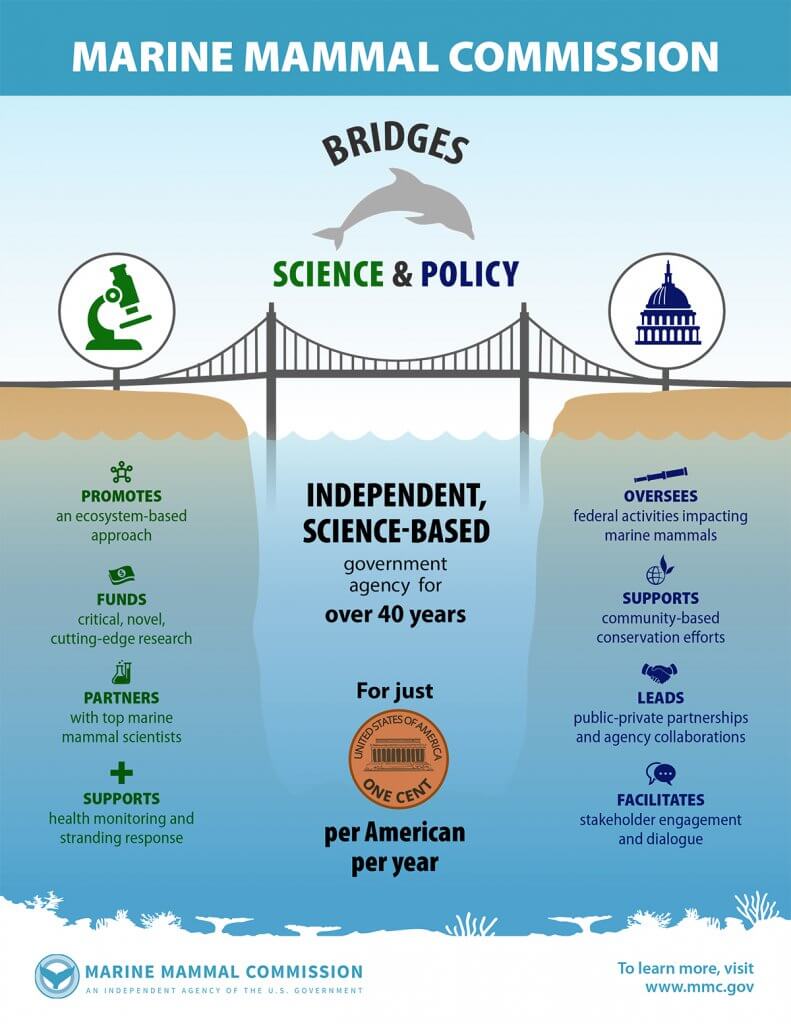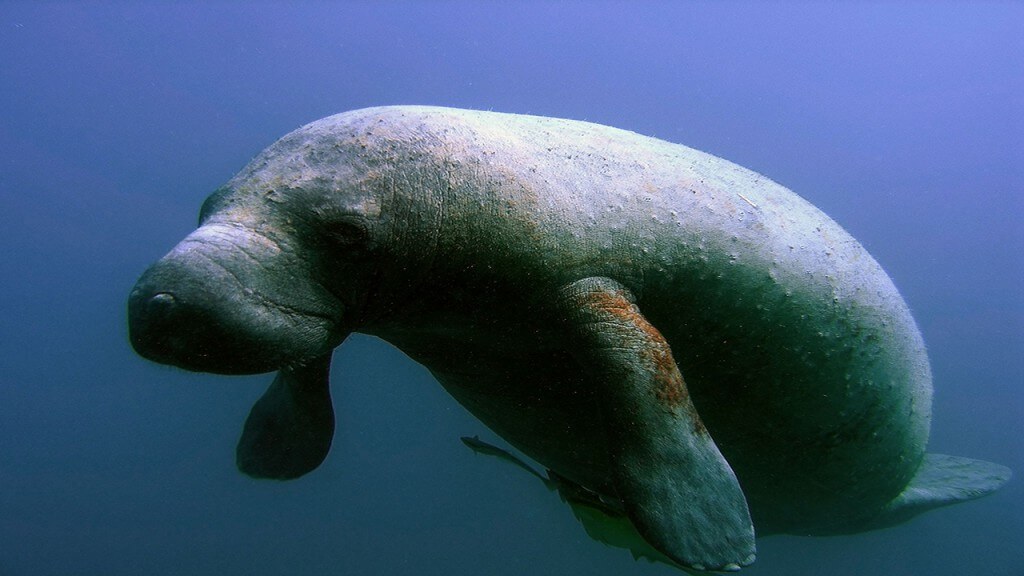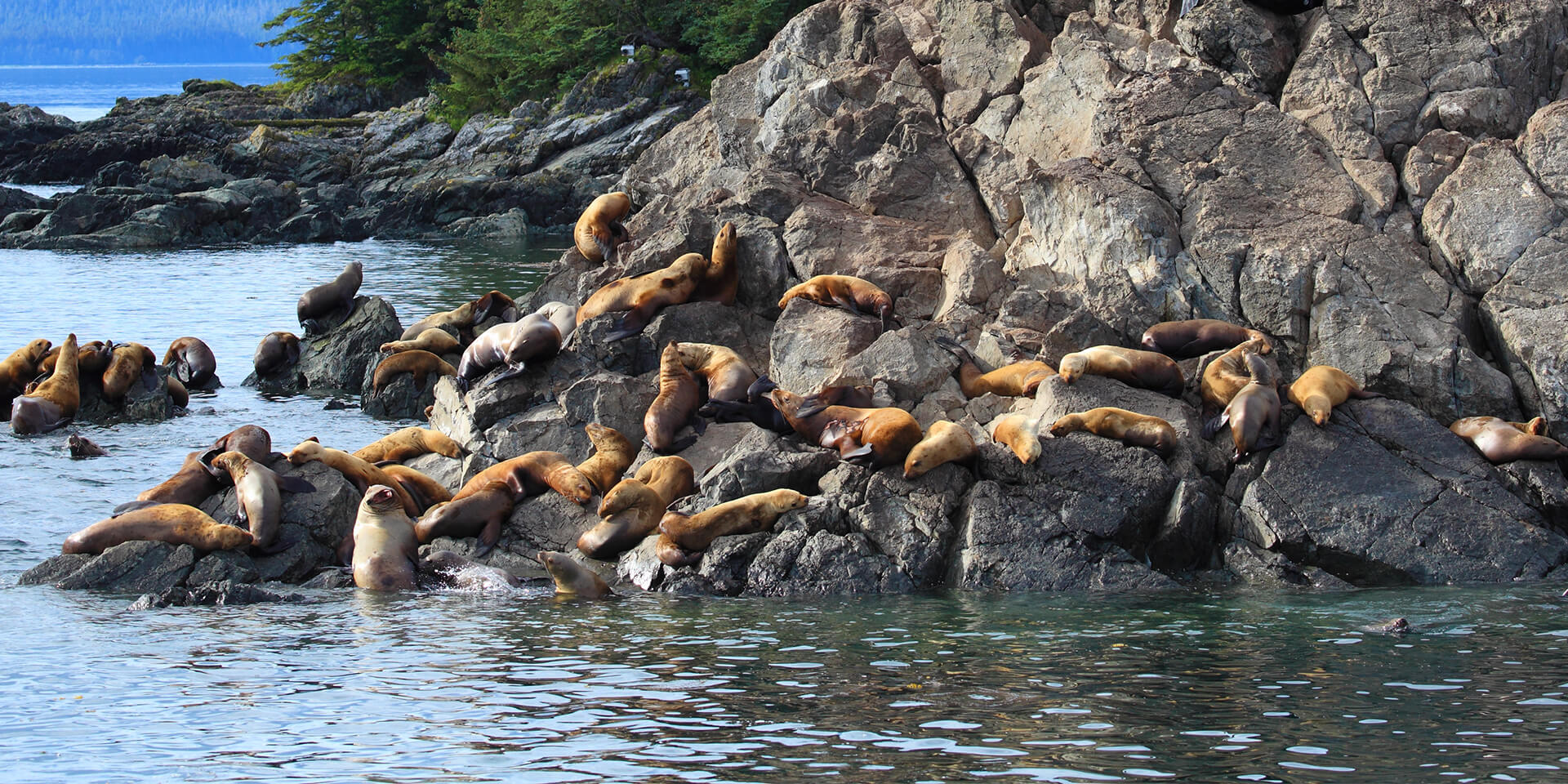About the Commission
Our Mission
To provide independent, science-based oversight of domestic and international policies and actions of federal agencies addressing human impacts on marine mammals and their ecosystems.

Humpbacks breach more than any other whale. It is unknown exactly why they do this so frequently, but some scientists believe the impact of hitting the water could be a way to remove skin parasites. Others think it might be a form of social interaction or play. (NOAA)
The Marine Mammal Commission is an independent government agency charged by the Marine Mammal Protection Act (MMPA) to further the conservation of marine mammals and their environment. We work to ensure that marine mammal populations are restored and maintained as functioning elements of healthy marine ecosystems in the world’s oceans. We provide science-based oversight of domestic and international policies and actions of federal agencies with mandates to address human impacts on marine mammals and their ecosystems. Our role is unique—we are the only U.S. government agency that provides comprehensive oversight of all science, policy, and management actions affecting marine mammals.
Who We Are
The Commission consists of three Commissioners appointed by the President, a nine-member Committee of Scientific Advisors, and 14 employees.
To learn more, meet our Commissioners, Scientific Advisors, and staff.
What We Do
 We provide oversight of all science, policy, and management actions affecting marine mammals for just about one penny per American per year. Click here to view graphic above.
We provide oversight of all science, policy, and management actions affecting marine mammals for just about one penny per American per year. Click here to view graphic above.
As an independent oversight agency, we are positioned to affect the evolution of policy decisions and help develop consensus among competing interests on controversial issues surrounding marine mammal science and conservation. We review proposed actions by federal agencies and others and provide recommendations to minimize the impacts of such actions on marine mammals and their environment.
Multiple human-related risk factors affect marine mammals, including direct and indirect effects of fisheries, underwater sound, contaminants and disease, harmful algal blooms and dead zones, vessel strikes, and impacts of climate change. We regularly consult with other federal agencies to understand, monitor, and mitigate these risk factors. Our work is centered on five strategic goals outlined in our FY2022–2026 Strategic Plan, and we pay special attention to species considered to be most vulnerable to human-related activities.
We carry out several activities to help ensure that the protection and conservation of marine mammals is reflected in a wide array of actions. Such activities include:
- reviewing permit and incidental take authorization applications, proposed regulations, National Environmental Policy Act (NEPA) documents (e.g., draft environmental assessments and impact statements), and Endangered Species Act (ESA) listing proposals;
- developing and/or reviewing marine mammal policy and guidance documents;
- producing periodic reports of particular importance to the conservation of marine mammals and maintenance of healthy ecosystems for Congress and relevant agencies;
- reviewing results of research, providing funding for research, and identifying significant gaps in research and seeking ways to close such gaps;
- participating in scientific and policy organizations and meetings, both domestic and international; and
- conducting the Commission’s Annual Meeting and producing reports on an annual basis highlighting the Commission’s performance and accomplishments.
Although not a regulatory agency, the Commission’s comments must be taken into consideration by the relevant action agencies. Should an agency choose to not follow the Commission’s recommendations, it must provide a rationale for taking a different approach.
We provide comments and recommendations regarding marine mammal protection and conservation to federal agencies and others through regular contact and meetings, as well as through formal letters. In these letters, we identify actions that agencies could take to conserve and manage marine mammals.
We are also periodically called upon to brief Capitol Hill staff and, less frequently, to present testimony to Congress regarding marine mammal protection and conservation issues.
Cross-Agency Collaborations
The Commission helps develop and coordinate multi-agency research and management initiatives to facilitate marine mammal protection and conservation, working closely with those agencies most directly carrying out the mandate of the MMPA. Key partners include the National Oceanic and Atmospheric Administration’s National Marine Fisheries Service (NMFS) and National Ocean Service (NOS), the U.S. Fish and Wildlife Service (FWS), the Bureau of Ocean Energy Management (BOEM) of the Department of Interior, the U.S. Department of Agriculture’s Animal and Plant Health Inspection Service (APHIS), and the National Science Foundation (NSF). We also work closely with the U.S. Navy, U.S. Coast Guard, and other branches of the military on their activities that may impact marine mammals and their habitats.

Florida manatee. (NOAA)
Collaboration regularly involves support and coordination on basic research. Through our grants and research program, we seek to identify key research priorities and help coordinate this work to eliminate duplication and ensure effective use of scarce research funds. We also work to ensure that scientific results are rigorously reviewed and used in management to develop, improve, or evaluate mitigation measures to benefit marine mammals.
Learn More about the Marine Mammal Commission
About the Commission: One-Page Infographic
To learn more about the Commission and our work, sign up for our e-newsletter and follow us on Twitter.
